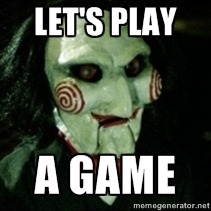Post by larissa on Apr 26, 2016 4:56:43 GMT
What drives our decisions?
More specifically, do you think you would make a good decision?

In the following scenarios, choose A. or B. In other words, which choice is more desirable.
According to Skeptical Medicine, these are the reasonings behind the decisions:
1.
This choice is framed in terms of high chance of significant gains. Most people will favor risk aversion. Most choose B. However, the mathematical expected value of A is $800 (80% x $1000).
2.
This is framed in terms high risk of significant loss. Most would favors risk seeking. Most take A. However the expected value of A is to lose $800 ( -$1000 x 80%). B is the better economical choice.
3.
This scenario is framed in terms of small chance for significant gain. Many will favor risk seeking and choose A. The economical choice is B because the expected value of A is to lose $1
([.1% x $9,000] -$10).
4.
This choice is framed in terms of a small chance for significant loss. Most will favor risk aversion and choose B. By now we can see that the economical choice is A because its expected value is $1,000. However, most of us would sleep better with choice B.
Why?
We tend to overweigh risk when faced with possible loss of a perceived gain. This means that we are afraid of losing what we have already gained, making us believe a risk is greater than what it really is.
We also undervalue risk when faced with certain loss. That is, when faced with certain loss, we are prone to believing a risk to be less than it really is.
What did you end up picking in the scenarios?
If your results were different, why do you think that is?
More specifically, do you think you would make a good decision?

In the following scenarios, choose A. or B. In other words, which choice is more desirable.
1.
A. 80% chance to win $1000.
B. $700 for sure
2.
A. 80% chance to lose $1000 (and 20% chance of losing nothing).
B. Lose $700 for sure.
3.
A. Bet $10 on a .1% chance to win $9,000.
B. Do nothing.
4.
A. 1% chance to lose $100,000.
B. Pay $1,100 for insurance against a 1% chance to lose $100,000.
A. 80% chance to win $1000.
B. $700 for sure
2.
A. 80% chance to lose $1000 (and 20% chance of losing nothing).
B. Lose $700 for sure.
3.
A. Bet $10 on a .1% chance to win $9,000.
B. Do nothing.
4.
A. 1% chance to lose $100,000.
B. Pay $1,100 for insurance against a 1% chance to lose $100,000.
According to Skeptical Medicine, these are the reasonings behind the decisions:
1.
This choice is framed in terms of high chance of significant gains. Most people will favor risk aversion. Most choose B. However, the mathematical expected value of A is $800 (80% x $1000).
2.
This is framed in terms high risk of significant loss. Most would favors risk seeking. Most take A. However the expected value of A is to lose $800 ( -$1000 x 80%). B is the better economical choice.
3.
This scenario is framed in terms of small chance for significant gain. Many will favor risk seeking and choose A. The economical choice is B because the expected value of A is to lose $1
([.1% x $9,000] -$10).
4.
This choice is framed in terms of a small chance for significant loss. Most will favor risk aversion and choose B. By now we can see that the economical choice is A because its expected value is $1,000. However, most of us would sleep better with choice B.
Why?
We tend to overweigh risk when faced with possible loss of a perceived gain. This means that we are afraid of losing what we have already gained, making us believe a risk is greater than what it really is.
We also undervalue risk when faced with certain loss. That is, when faced with certain loss, we are prone to believing a risk to be less than it really is.
What did you end up picking in the scenarios?
If your results were different, why do you think that is?
